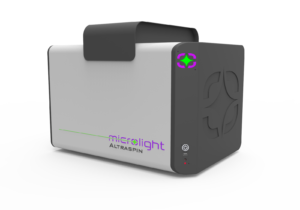Novel 3D printing technique produces extremely smooth surfaced micro-parts without need for post-processing; saving time and costs in industrial prototyping.
 Microlight3D, a specialty manufacturer of ultra hi-resolution 3D microprinting machines for industrial and scientific applications, announces the launch of Altraspin™, a compact turnkey 3D printer for producing highly complex micro-parts with sub-micron resolution.
Microlight3D, a specialty manufacturer of ultra hi-resolution 3D microprinting machines for industrial and scientific applications, announces the launch of Altraspin™, a compact turnkey 3D printer for producing highly complex micro-parts with sub-micron resolution.
Altraspin prints micro-parts with a resolution 100x smaller than a strand of hair for applications requiring exact precision and a high-quality surface finish. These include creating micro-optics, micro-sensors and printing shapes that fit inside microfluidic devices. It is also suited to metamaterials, cell culture, tissue engineering, microrobotics, micromechanics and surface structuration.
“Microlight3D designed Altraspin to respond to manufacturing demands for more customization and the rapid prototyping of submicron parts that are not constrained by their geometric or organic shape,” said Denis Barbier. “We removed another constraint by extending user choice in the materials available for 3D microprinting. Altraspin is compatible with a wide range of polymers and biomaterials, including those of our customers. Without a doubt, the submicron resolution our technology obtains has been key to our growing success within the scientific community. We anticipate that industrial companies will also benefit from the advantages of our 3D-printer for micro-parts, geared to helping them overcome limitations and reduce time-to-market.”
The sub-micron resolution Altraspin achieves, as low as 0.2µm, is based on a two-photon polymerization direct laser writing method plus its proprietary ‘continuous print flow’ technique. This technique is not constrained by the conventional additive layer-by-layer approach that limits standard 3D printing resolution to 25µm. As a result of Microlight3D’s submicron resolution, it can print micro-parts so smooth that they do not require post-processing. Elimination of this step brings manufacturers advantages in both time and cost.
Altraspin features a new TPP slicing tool, high-writing resolution and precision, and high-writing speeds, for complex 3D structures. It is compatible with any CAD models and files and its compact design is suited to laminar flow cabinets, clean-room and sterile environments, which prevent contamination of wafers.
Microlight3D focused on ease-of-use in its design of Altraspin. Once the user has designed a 3D model using standard CAD tools and chosen an appropriate polymer material, Microlight3D’s algorithms calculate the path that the laser will take to create the object. A laser pulse writes directly inside the liquid-material bath, solidifying the path it takes with the extreme precision, less than a micron. As the laser is able to move freely and continuously, it can build the most complex architectures, without the limitations of the traditional ‘layer-by-layer’ approach. Once the operation is complete, a solvent washes away the excess monomer, allowing users to immediately handle the object, identical to the initial model.
Microlight3D will exhibit Altraspin at BIOS, San Francisco, California (USA), booth #8136, February 2 – 3, 2019.



